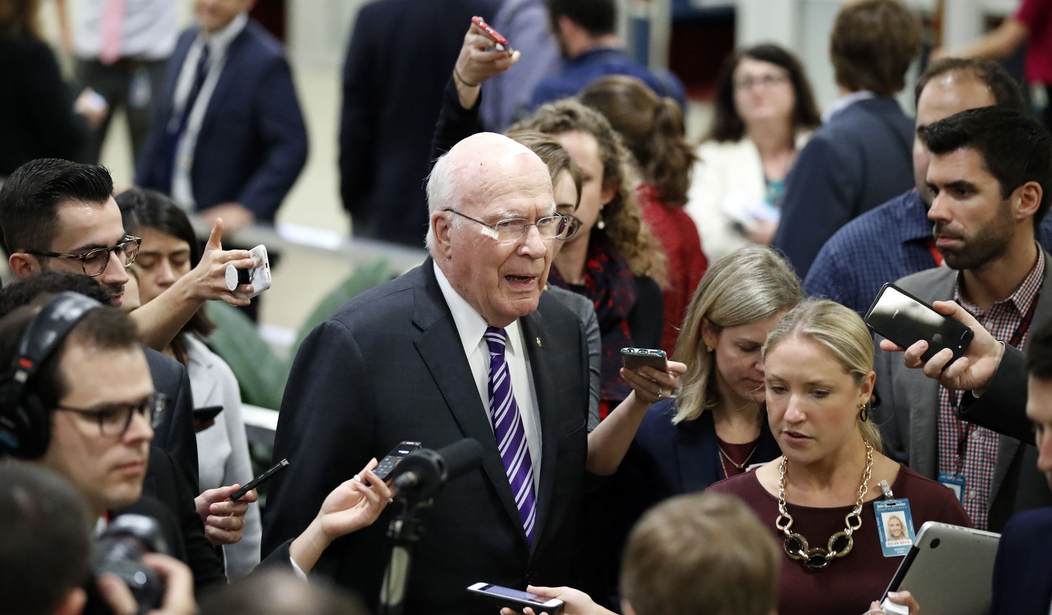Just last week the outlook for an omnibus spending bill looked so bleak that Democrats were preparing a plan to force through a one-year stopgap bill. What a difference a week can make, however… maybe. Working late into the night, lawmakers from both parties hammered out a bipartisan agreement on a comprehensive one-year spending plan. Of course, as this report from Eric Katz at Government Executive notes, none of them have agreed on any of the specifics yet, so it could still fall apart. What they’ve actually managed to do was agree to agree on something. (If you’ve been watching the comings and goings in the swamp for a while, you already know that this isn’t all that unusual.) The leading author of this “progress” was Patrick Leahy.
Top negotiators reached a bipartisan framework agreement for a full-year funding measure for the remainder of fiscal 2023, finally clearing a major hurdle that had threatened extended stopgap measures or a government shutdown.
Lawmakers must still negotiate the details of the bill to set line-by-line funding for every agency in government, but the deal allows appropriators to begin writing the measure in a bipartisan fashion. Congress is still expected to pass a one-week continuing resolution to avoid a shutdown late Friday and give the negotiators until Dec. 23 to draft and pass the final agreement. Sens. Patrick Leahy, D-Vt., and Richard Shelby, R-Ala., who lead the Senate Appropriations Committee, and Rep. Rosa DeLauro, D-Conn., who chairs the House panel, announced the framework Tuesday evening.
The deal “should allow us to finish an omnibus appropriations bill that can pass the House and Senate and be signed into law by the president,” Leahy said.
There are still several steps to be taken before they’re out of the woods. First of all, the current spending bill expires in two days, so they will need to pass a one-week stopgap measure to keep the lights on while the remaining details are hammered out. That portion doesn’t seem to be in any danger, since there is already bipartisan support for seven days of funding.
The problem is that the current negotiations really haven’t gelled on anything other than some of the standard, default items. The two sides haven’t even agreed on a total budget cap yet. At last count, they were still $25 billion apart. The defense spending bill has already passed in the Senate and is expected to pass in the house as well. It’s the non-defense budget that remains up in the air.
Democrats have continued to push for the same 10% increase in non-defense spending as they injected into the defense bill. Republicans have balked at that based on how far the debt was run up over the past two years. They appear to be willing to go as far as a 9.5% increase. Is that really all that much of a gap to close?
The one person who seemed to be absent during these negotiations was Kevin McCarthy. The last we heard from him was a declaration that he was a “hell no” on any omnibus spending bill. His plan was to approve a one-month stopgap measure so that the House could deal with it after the GOP takes back the majority in January.
The coming ten days could prove to be a serious test of McCarthy’s leadership and influence, as well as his prospects for being the next Speaker. It really wouldn’t take all that many members in the House to reject his position and pass the spending passage without his support. If the Democrats can actually get their entire caucus on board they wouldn’t need any Republicans at all, but they’ll still want to trumpet it as a “bipartisan” solution just for the optics. Last week I would have placed the chances of seeing a full year’s budget passing at barely five percent. Today I would bump that up to around 25, but it’s still far from a sure thing.








Join the conversation as a VIP Member